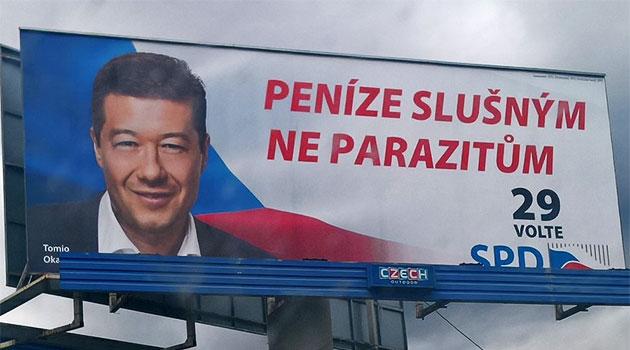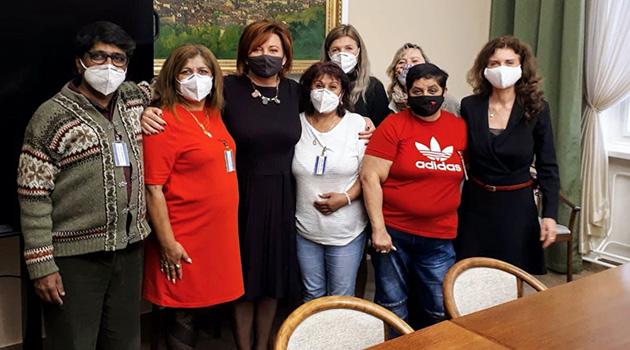Czech NGOs say lawmakers want to cut welfare despite impending social crisis

On Wednesday the Czech Chamber of Deputies was scheduled to discuss two different bills amending Act No. 111/2006 Coll., on aid to those in material distress. Both would fundamentally transform legislation and involve controversial aspects that could complicate the lives of the most impoverished.
A growth in crime, the poorest of the poor becoming homeless, children in single-parent families being endangered, and other risks could result from the amendments. Among the socially most vulnerable, the consequences of the COVID-19 crisis could fall on no small part of the population.
A bill originally submitted by the “Freedom and Direct Democracy” (SPD) party (House Press no. 652/0, section no. 1/4) broadens the group of people who would lose their claims to aid in material distress. Persons who have been administratively punished for failing to bring their children to compulsory preschool would lose any claim to these benefits.
Currently, aid in material distress can only be cut off for an individual whose children do not attend compulsory school from the first through the ninth grade, but there is controversy over what impact this has. There are no exact data available about how the current legislation is impacting attendance, although from practice we know that depriving families of these benefits frequently causes them even bigger problems.
“We are of the opinion that the situation should be addressed in cooperation with child welfare authorities and other services instead of pushing families into even greater financial and material deprivation,” said Adam Fialík, an analyst with the Platform for Social Housing. From the explanatory memorandum on the SPD amendment it follows that the bill is also targeting such benefits when they are claimed by foster parents, which is discriminatory and intends to disadvantage foster care provided by extended family members.
“Any changes based on relationships among relatives should first be part of a broader discussion with experts. Foster care provided by relatives from an extended family is of a different character than foster care provided by a grandmother taking care of the child of her own deceased or seriously ill daughter,” warned Anna Krbcová of the Association for the Child and the Family (Asociace Dítě a rodina).
The bill drafted by the Civic Democratic Party (ODS) is even more critical (House Press 290/0, section no. 1/4). There are three main reasons it is problematic from the start.
First, the bill would make it possible for creditors seeking payment of fines levied against persons convicted of misdemeanors to attach or garnish welfare benefits for the amount owed – the first such benefit to be diverted to paying such fines would be the housing contribution, followed by the subsistence contribution. “What has been repeatedly underway here is an attempt to tighten repression where repressive methods will have no effect. The consequence could be, paradoxically, even more of a growth in crime,” Fialík warned.
“If we sharply reduce or even entirely divert aid to those in material distress who have committed misdemeanors, it is highly likely that if those people do not manage to become formally, gainfully employed, they will take advantage of illegal ventures to secure money,” Fialík said. The ODS bill would constitute an unprecedented interference with people convicted of misdemeanors who qualify for welfare being able to provide for their basic needs.
Official punishments are always chosen with a view to their suitability for a situation, but the ODS bill would mean that people would lose the opportunity of using welfare to cover their housing costs because they committed a mere misdemeanor. Currently it is impossible for aid to those in material distress to be attached or garnished in order to pay off a debt, not even through a collections proceedings.
“This is based on the simple fact that aid to those in material distress is set up so that a person can just use it to survive, in practice. Any reduction to that amount of money would just worsen the person’s social situation and could force welfare recipients into a situation with no solution,” explained Fialík.
Even if the most optimistic variation of those envisioned by the drafters of the ODS bill were to apply, people living in residential hotels and other substandard forms of housing would remain endangered. “Let’s imagine, for example, a situation in which people living at a residential hotel have the entire amount of their aid in material distress benefit diverted to pay a debt. Even those who work will not receive any other money until the following month. They will not be able to pay their rent and they will be evicted,” the expert explained.
The ODS amendment would impact those whose salaries or other sources of income are the very lowest. These are citizens who already are living on the edge of poverty and who would be forced into an even deeper crisis.
Moreover, the ODS bill has apparently not been sufficiently thought through from a technical standpoint. For example, it counts on being applied to misdemeanors for which no definition yet exists, in the section that reads: “child neglect consisting of unexcused absence from more than 100 hours of compulsory school attendance per semester.”
“The Education Act does not define how long of an absence constitutes neglect,” Fialík said. Magdalena Opletalová of the Fokus Praha organization added that “The consequence of the ODS bill would be that parents would have to excuse their children’s truancy in order to avoid getting into problems because of them.”
The ODS bill also does not address whether there would be a ceiling to the deductions from aid to those in material distress made for the purpose of paying fines, and it is therefore realistic to anticipate that some people could lose the entire amount of all such benefits to which they are entitled and not even have the lawfully-guaranteed minimum income left over. The Platform for Social Housing, the Salvation Army, and other nonprofit organizations working in the field consider both bills to be not just insufficiently developed, but also exceptionally risky.
Given the impending economic recession, welfare could save many families and individuals from falling to the very bottom of extreme social exclusion. To discuss any restrictions on benefits is, therefore, absolutely inappropriate at this time, according to the NGOs.
“During the COVID-19 pandemic and the weakening of the economy we must carefully assess crucial changes to the welfare system and design them systematically, based on the available data, not just on ideological positions,” warns the director of the Platform for Social Housing, Vít Lesák. The Czech Labor and Social Affairs Ministry, in his view, should design any systemic transformations.
Lesák said amendments that have not been well-developed and that are proposed by MPs without close consultation with those involved are socially irresponsible. Jan František Krupa, national director of social services for the Salvation Army, said that “As nonprofit organizations that work on a daily basis with people who are in danger, we know the reality in the field very well. There are many experts among us who would be glad to aid the ministry with thinking through these transformations so they make sense and do not endanger the dignified existence of our fellow citizens. The expertise of people with practical expereince should always be preferred over political inventions in such cases.”
Krupa said that open, participatory, professional debate should always be part of such proposals and that it would be important to invite experts and people with practical experience to contribute to such discussions in a timely way. Lesák, speaking for the Platform for Social Housing, said: “We hope the ministry will continue to not support these bills and that it will prefer to work on systemic transformations that are based on data and thought through, above all by addressing rising unemployment, indebtedness, and homelessness.”
